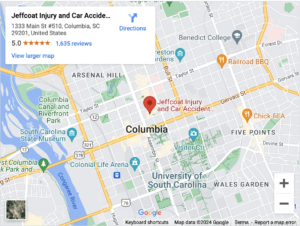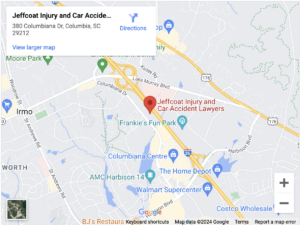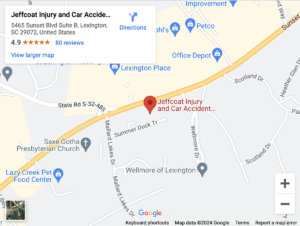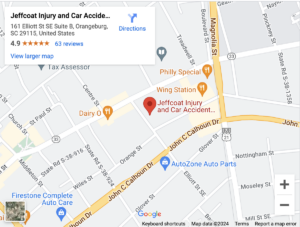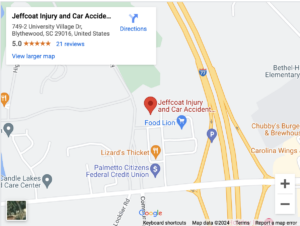April 25, 2025 | Columbia Personal Injury Blog \ Uber Accident Lawyer Near You

The Critical First 24 Hours After Your Rideshare Accident
The moments following a rideshare accident can be chaotic and overwhelming. Whether you were a passenger in an Uber, a Lyft driver, or another motorist involved in a ride-sharing vehicle collision, the actions you take within the first 24 hours can significantly impact your ability to recover compensation. In South Carolina, rideshare accidents present unique legal challenges due to the complex insurance structures and liability questions that arise when transportation network companies are involved. Understanding the essential steps immediately after your accident can protect your health, rights, and potential compensation claim.
Don’t let the complexities of a rideshare accident claim overwhelm you. Reach out to Jeffcoat Injury and Car Accident Lawyers for guidance and support. Give us a call at (803) 200-2000 or contact us today to ensure your rights are protected, and your path to recovery is clear.

Understanding South Carolina’s Rideshare Laws and Your Rights
South Carolina has specific regulations governing transportation network companies (TNCs) like Uber and Lyft under Title 58, Chapter 23 of the state code. These laws establish insurance requirements, driver screening protocols, and passenger protections that differ significantly from traditional auto accident scenarios. When you’re involved in a rideshare accident, your legal rights depend on your role (passenger, driver, pedestrian, or other motorist) and the rideshare driver’s status during the crash. In South Carolina, rideshare companies must maintain different levels of insurance coverage depending on whether the driver was actively transporting a passenger, waiting for a ride request, or using the vehicle for personal purposes. Understanding these distinctions is crucial because they directly affect who pays for your injuries and damages.
The 5 Essential Steps to Take Within 24 Hours of a Rideshare Accident
The first day after a rideshare collision is critical for preserving evidence, protecting your health, and establishing the foundation for a potential claim. These five essential steps can distinguish between a successful recovery and a denied claim. What many accident victims don’t realize is that rideshare companies have teams of investigators and attorneys who begin working immediately to minimize their liability, which makes your swift action even more critical.
How a Skilled Attorney Can Navigate Your Rideshare Accident Claim
Resolving a rideshare accident claim requires understanding the complex interplay between personal auto insurance policies, rideshare company coverage, and South Carolina’s transportation network company laws. At Jeffcoat Injury and Car Accident Lawyers, we’ve developed specific expertise in handling the unique aspects of rideshare collision cases in South Carolina. Unlike typical car accidents, rideshare cases often involve multiple insurance carriers who may dispute responsibility, leaving victims caught in the middle. Our approach involves immediately preserving electronic evidence from the rideshare app showing the driver’s status, identifying all potential insurance coverage sources, and advocating for your full compensation for medical expenses, lost wages, pain and suffering, and other damages. The resolution process typically involves thorough documentation of your injuries, strategic negotiation with multiple insurance carriers, and, when necessary, litigation to secure fair compensation.
Understanding the Three Insurance Phases in South Carolina Rideshare Accidents
One of the most confusing aspects of rideshare accidents is determining which insurance policy applies based on the driver’s status at the time of the collision. South Carolina law establishes specific insurance requirements for transportation network companies that vary dramatically depending on when the accident occurs. Knowing which phase your accident falls under is critical for accessing appropriate compensation.
The Personal, Waiting, and Ride Phases of Coverage
When a rideshare driver is using their vehicle personally with the app off, only their personal auto insurance applies. Once they turn on the app and wait for ride requests (Phase 1), South Carolina law requires TNCs to provide contingent liability coverage of at least $50,000 per person and $100,000 per accident for bodily injury, plus $50,000 for property damage. When a driver accepts a ride and is en route to pick up a passenger or has a passenger in the vehicle (Phases 2 and 3), coverage increases dramatically to at least $1 million in liability insurance. We’ve seen many cases where insurance companies attempt to misclassify the driver’s status to reduce payouts, which is why securing evidence of the app’s status immediately after an accident is so crucial for our clients.
Common Injuries in Columbia Rideshare Accidents and Their Long-Term Impact
Rideshare accidents often result in injuries that may seem minor initially but can develop into serious medical conditions over time.
Documenting Delayed-Onset Injuries
Whiplash, traumatic brain injuries, and spinal cord damage frequently manifest symptoms days or even weeks after a rideshare accident. Proper medical documentation established shortly after the accident creates a critical link between the collision and these injuries for your claim. Without this documentation, rideshare companies and their insurers often argue that later-appearing symptoms are unrelated to the accident. Follow all treatment recommendations and record how your injuries affect your daily life, work capacity, and overall well-being. These records become invaluable evidence if your case proceeds to litigation.
Navigating the Unique Challenges of Rideshare Company Defenses
Transportation network companies like Uber and Lyft employ sophisticated legal strategies to minimize their liability after accidents. Understanding these tactics is essential for protecting your claim from common defense maneuvers that can significantly reduce or eliminate your compensation.
The Independent Contractor Defense and How to Counter It
One of the primary defenses rideshare companies use is claiming their drivers are independent contractors rather than employees, which they argue limits the company’s liability for driver negligence. South Carolina courts have issued varying rulings on this issue, making each case highly fact-specific. Countering this defense requires demonstrating the level of control the rideshare company exerts over drivers through app requirements, rating systems, and operational guidelines. Gathering evidence of communications between the driver and the company, app notifications, and company policies can be crucial in establishing the true relationship. Additionally, South Carolina’s transportation network company laws place specific responsibilities on the companies regardless of employment classification, providing alternative avenues for establishing liability.
The Financial Reality of Rideshare Accident Recovery in South Carolina
Many rideshare accident victims underestimate the financial impact of their injuries and the complex process of securing fair compensation. Understanding the true costs associated with rideshare accidents can help you make more informed decisions about your case and avoid accepting inadequate settlement offers.
Looking Beyond Immediate Medical Expenses
While immediate medical bills are often the most visible expense following a rideshare accident, they typically represent only a fraction of the true financial impact. Future medical care needs, diminished earning capacity, and long-term rehabilitation costs must all be carefully calculated before settling your claim. In South Carolina, you may also be entitled to compensation for non-economic damages such as pain and suffering, emotional distress, and loss of enjoyment of life. These damages often substantially exceed the value of medical expenses but require skilled legal advocacy to properly document and prove. Insurance companies representing rideshare companies typically make initial settlement offers that address only immediate medical costs, hoping victims will accept before understanding the full scope of their damages.
Frequently Asked Questions
1. How does rideshare insurance coverage in South Carolina differ from regular auto insurance?
South Carolina’s transportation network company laws require rideshare companies to provide tiered insurance coverage depending on the driver’s status. When the app is off, only the driver’s personal insurance applies. When the app is on but no ride is accepted, contingent coverage of $50,000 per person/$100,000 per accident for bodily injury is required. Once a ride is accepted through completion, coverage increases to at least $1 million. This tiered structure creates complexities that don’t exist in typical auto accidents, often requiring skilled legal knowledge to navigate successfully.
2. Can I file a Columbia rideshare accident lawsuit if I was a passenger in an Uber or Lyft?
Yes, as a passenger, you generally have strong legal options after a rideshare accident in Columbia. Passengers benefit from the maximum insurance coverage ($1 million liability policy) and typically aren’t considered at fault. You may have claims against the rideshare driver, the rideshare company, other motorists involved in the accident, or a combination of these parties. South Carolina’s comparative negligence rules are unlikely to reduce your compensation as a passenger, making passenger claims often more straightforward than other rideshare accident scenarios.
3. What evidence should I collect at the scene of a rideshare accident to strengthen my claim?
Immediately after a rideshare accident, try to document: screenshots of the rideshare app showing the trip in progress; photos of all vehicles and their damage from multiple angles; the driver’s rideshare identification and insurance information; contact information for all parties and witnesses; road conditions and traffic signals; your visible injuries; and notes about what happened while your memory is fresh. If possible, ask the driver to show their app screen so you can photograph whether they were in active driver mode and what phase they were in (waiting for ride, en route to pickup, or during a trip).
4. How long do I have to file a rideshare accident claim under South Carolina law?
In South Carolina, you generally have three years from the date of the accident to file a personal injury lawsuit for a rideshare accident under the state’s statute of limitations. However, the practical timeline for building a strong case is much shorter. Critical evidence like app data, driver logs, and witness memories can disappear within days or weeks. Additionally, rideshare companies have specific reporting requirements that may be as short as 24-48 hours after an accident, making prompt action essential for preserving your rights.
5. What if the rideshare driver who caused my accident in South Carolina was from another state?
If you’re involved in an accident with an out-of-state rideshare driver in South Carolina, state law still governs the case since the accident occurred here. South Carolina’s transportation network company regulations apply regardless of where the driver is from, and the rideshare company’s insurance policies still cover the accident according to South Carolina requirements. The case would likely proceed in South Carolina courts, though multi-state elements can add complexity to the case, making experienced legal representation particularly valuable in these scenarios.
Work with a Rideshare Accidents lawyer
When you’re recovering from a rideshare accident, navigating the legal and insurance complexities shouldn’t add to your burden. A rideshare accident lawyer in Columbia can manage your entire claim while you focus on healing. From investigating the accident and determining which insurance policies apply to calculating your full damages and negotiating with multiple parties, legal representation ensures your rights are protected throughout the process. An attorney familiar with South Carolina’s transportation network company laws can identify legal issues specific to rideshare cases that general practice attorneys might miss. Most rideshare accident attorneys offer free consultations to discuss your situation and operate on contingency fees, meaning you pay nothing unless they secure compensation for you. This arrangement provides access to legal expertise regardless of your current financial situation and ensures your representative is fully invested in maximizing your recovery.
Don’t let the aftermath of a rideshare accident leave you in a bind. Reach out to Jeffcoat Injury and Car Accident Lawyers for the guidance you need. Give us a ring at (803) 200-2000 or contact us to ensure your rights are safeguarded, and your path to recovery is smooth.

